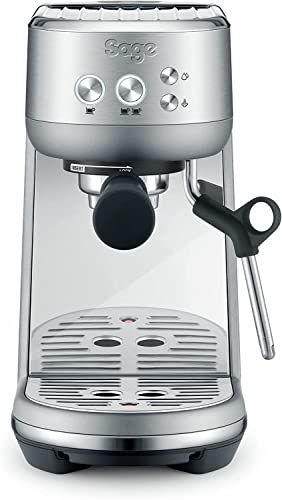Benefits of an Espresso Machine
In an espresso machine, hot water is pushed through finely grounded coffee beans. This results in a smooth, rich drink, known as espresso.
The first espresso machines were steam powered. These machines utilize a single boiler to make multiple drinks at once. The water is close to boiling when it gets to the "group head," where a portafilter secures the.
Health Benefits
The caffeine in espresso is a potent stimulant that helps brighten a person's mood. This is especially beneficial to those who suffer from depression, as it can lift their spirits and give them the energy they need to make it through their day. It can also ease fatigue, a typical symptom associated with depression. In addition coffee has been proven to improve short-term memory and the capacity to solve problems. These benefits are also beneficial for employees in the office who need to remember details about deadlines and projects.
If one has an espresso machine at home and can make a delicious cup cappuccino or coffee whenever they'd like. It will save them money and time since they don't have to visit a café. It can also be convenient when entertaining friends or family because they can serve a delicious drink at their home.
When you are choosing an espresso maker It is important to think about how easy it is to use and if there are any additional features, such as milk frothers or built-in coffee grinder. It is also a good idea to know how many drinks the machine can produce at a time and if it has steam wands that can be used to make lattes.

Energy Boost
It is ideal to have an espresso maker in your home for when you wish to serve guests an excellent espresso. It also saves money on coffee shop visits. It is recommended to purchase an espresso machine that allows you to adjust the amount of water and coffee utilized, so you can manage the strength of your espresso and how much foam (crema) is produced.
Most appliance stores stock a manual espresso maker. These machines typically come with a portafilter that you fill with ground beans and then compress through a process known as "tamping." You'll have to pump a lever to create the pressure necessary to extract the flavor from the ground beans. Certain models come with a steam wand that can be used to heat and froth milk, which allows you to make drinks like lattes and cappuccinos.
A newer development in espresso machines is the super-automatic which is similar to a regular automated but has greater consistency. These machines are programmed to make an exact size espresso. They are easier to use, and have been awarded top marks in Lab testing. These machines can grind beans, measure and tamp them at the touch of a button. Some models come with built-in coffee grinders and can make espresso as well as brewed coffee, however they are more expensive than manual or semi-automatic models.
Anti-Inflammatory
Espresso and coffee can give you a healthy boost of energy but they should be consumed in moderation. This can help prevent digestive issues, anxiety, and high levels of caffeine. It is also essential to drink high-quality coffee to avoid the adulterants used in lower-quality espresso, which can be detrimental to your health.
Research has demonstrated that the polyphenols present in coffee, including CGA which has anti-inflammatory properties. They have bacteriostatic effects and bactericidal properties on many harmful microorganisms. These can thrive in different parts of the human body. This includes oral bacteria that cause caries as well as intestinal bacteria.
The two diterpenes to blame for coffee's adverse effects, cafestol & Kawheol, are also identified to possess anti-inflammatory properties as well as antioxidant and anti-fibrotic properties. According to a study that was published in International Journal of Molecular Sciences the bioactive compounds could be responsible for the positive effects of coffee on the health of humans. Other studies have also connected CGA to lower rates of diseases and higher longevity.
espresso maker for home : Lower Risk
In a world where diabetes is growing more common, many people are searching for ways to reduce their risk. Coffee is a great way to reduce the risk. The caffeine in coffee can increase metabolism and decrease blood sugar levels following a meal. It also helps reduce the risk of developing type 2 diabetes through decreasing cholesterol levels. It is recommended to reduce the amount of coffee you drink every day. If you are sensitive to caffeine, it is best that you limit your intake of caffeine to one cup per day.
A new study from Sweden confirms previous studies that have linked drinking coffee to a lower risk of developing type 2 diabetes. This study is different from other studies because it differentiates the filtered coffee from the boiling coffee to better understand the health effects of coffee.
Researchers applied a technique referred to as metabolomics in conjunction with conventional food questionnaires. This technique measures the presence of certain compounds in the body and is extremely accurate in comparison to intakes reported by individuals from questionnaires. Researchers also controlled for factors such as sex status, smoking status and coffee preparation methods to keep out confounding factors from impacting the results.
While the results were evident However, the scientists aren't sure of the exact mechanism behind it. They suspect that the positive effects of coffee could be due to diterpenes, which hinder the absorption of glucose in the liver and improve the metabolism of glucose. They would like to further study these differences in a future study.
